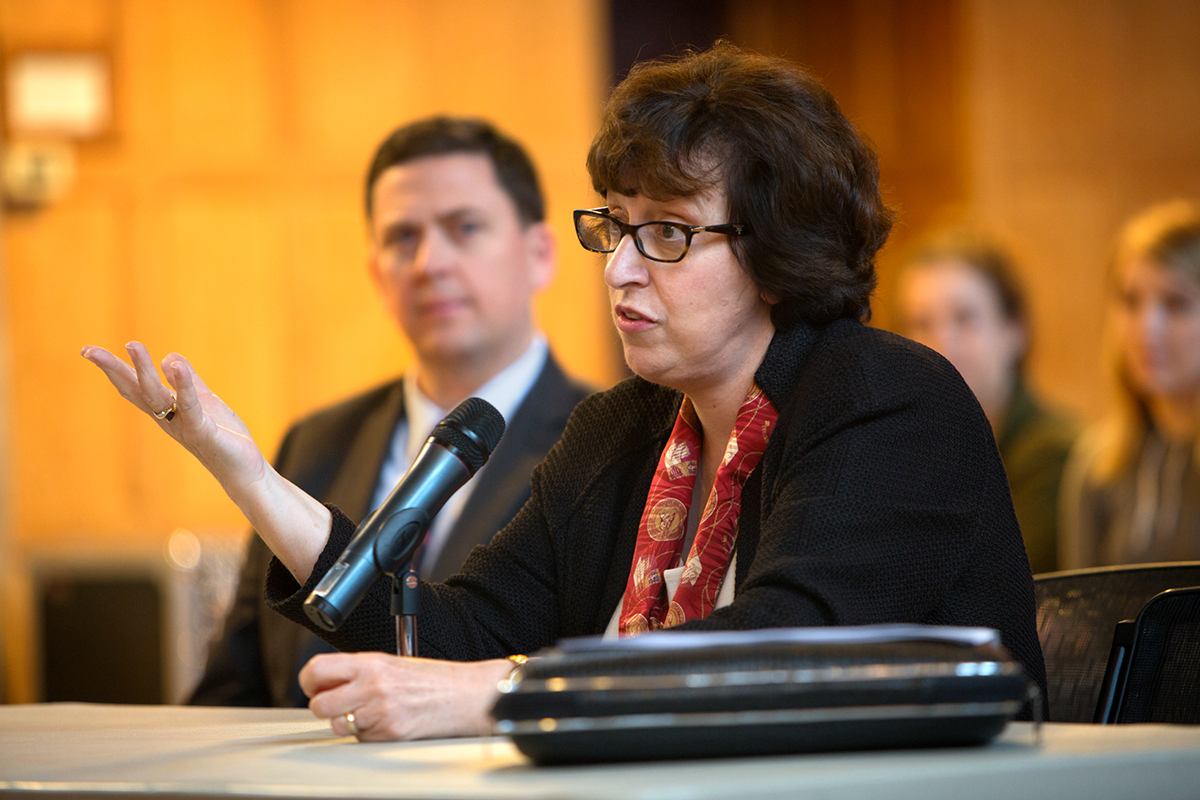President Pollack stops by Student Assembly for a Q&A
By Joe Wilensky

Cornell President Martha E. Pollack stopped by the Student Assembly meeting in Willard Straight Hall April 20, her fourth day in office, to make brief remarks before taking questions for about a half hour.
“I’m delighted to be here,” she said, adding that she had met many students already and has been impressed with their deep commitment to Cornell and to making a difference in the world.
She told SA members that of the things she values very highly, “the first, by far, is integrity and trust.” She noted that if you have trust, then “you can make a lot of progress, even when you fundamentally disagree.”
Also at the top of that list is her commitment “to a high-quality, excellent education, both inside and outside the classroom.”
For the SA members who are seniors graduating in May, she offered advice: “You should learn to accept change … people have a hard time with change, they don’t like change, but the people that I see who are most successful, they work hard and they are people who can roll with the punches.”
Pollack noted that she is deeply committed to diversity and the celebration of difference, describing it as not only important for reaching better solutions, but also saying that it is “the right thing to do. It’s a really core value for me.”
Another core value is her firm commitment to free speech, she said, noting that she intends to uphold opportunities for free speech on campus.
As president, she said her priorities will include focusing on the Ithaca campus, as well as the opportunities of Cornell’s programming and campuses in New York City; Cornell’s commitment to great academics; and the university’s land-grant tradition of reaching out to the world.
Highlights from the following Q&A session:
• Asked how the university will enforce its Code of Conduct if controversial speakers are disrupted by protesters, Pollack said the code does need to be enforced, but this is an issue on which she wants to work with the SA. “This is an educational institution, so I prefer to look at this as an opportunity where we, as a community, are educating one another about the value of free speech,” she said. “Even being able to have a debate about whether a speaker should be on campus is part of that free speech. … If there is a speaker whose views are particularly egregious to the community, what you do is you let that person speak. … But you provide opportunities and space for protest; you provide alternative activities. History has shown that it is the most marginalized groups that suffer the most when speech is not allowed to be free.”
• On a question about rising tuition and other costs, Pollack said that as provost and as vice provost for academic and budgetary affairs at the University of Michigan, she “spent quite a lot of time thinking about, and working on, budgets, access and affordability, and financial aid. … There’s always a very fine line to walk if you want to drive down costs as much as possible but you [also] want to preserve the value of a Cornell degree,” she said. “It is still the case that there’s an enormous return on investment in your college degree. And we don’t want to jeopardize that.”
• On her commitment to shared governance, Pollack said: “I am a very firm believer that you don’t make any decision without hearing from all the stakeholders. And not just hearing from them, but really taking in what they say, listening to people and learning from them.” She said that ultimately, as president, she has obligations and responsibilities that mean that she won’t always agree with recommendations, but she will consistently take them into consideration.
• On the advantages of a liberal education: “One thing that [President Emeritus] Hunter Rawlings did so well was to use the power of the bully pulpit to speak eloquently about the importance of the humanities.” She said she wants to talk about why a broad, liberal education is so important – “not just internally but externally. I think the world has forgotten why, particularly, the humanities are so important.”
• Asked how she will make time to listen to students, she said that through the summer she will get out as much as she can to meet with and talk with students and, by fall, regular access and channels for her to communicate with students will be in place.
Media Contact
Get Cornell news delivered right to your inbox.
Subscribe